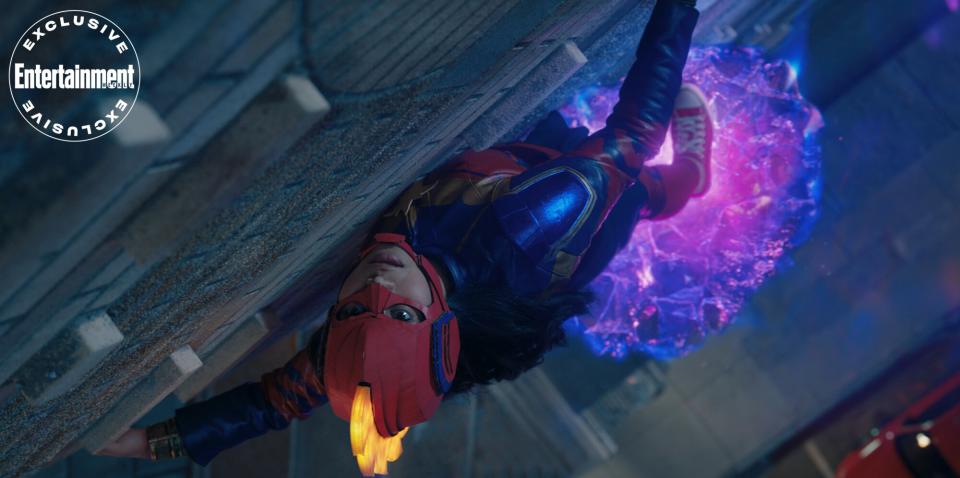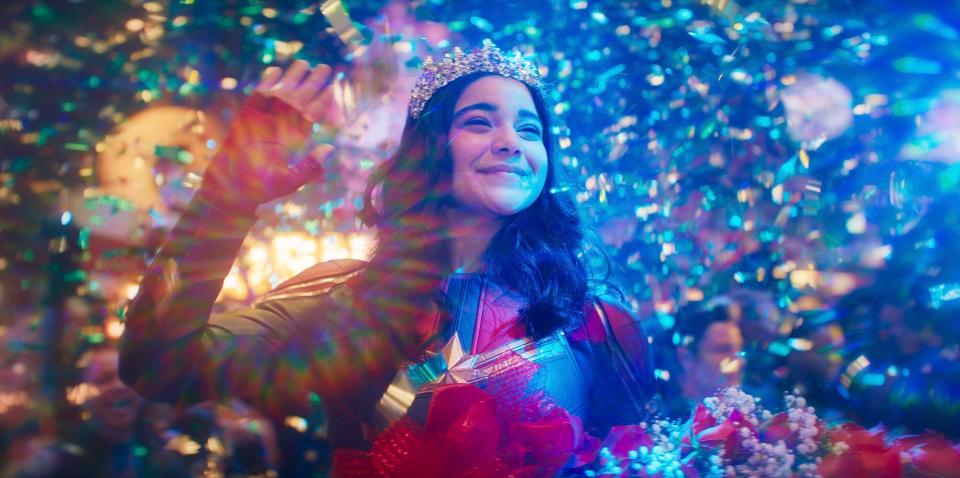Ms. Marvel writer Bisha K. Ali on the 'responsibility' of bringing Kamala Khan to the screen

- Oops!Something went wrong.Please try again later.
Kamala Khan didn't make her comics debut until 2013, but in less than a decade, the superpowered Jersey teenager has become one of Marvel Comics' most beloved new heroes. So when Ms. Marvel head writer Bisha K. Ali signed on to help bring Kamala's story to the screen, she knew she had a tall task ahead of her.
Ali is no stranger to the sprawling Marvel Cinematic Universe, having written on last year's Loki. But serving as the head writer of Ms. Marvel was a much larger assignment — and a far more personal one. As a British Pakistani writer, Ali had long been fan of Ms. Marvel's adventures in the comics, and she knew that adapting Kamala's story for a Disney+ show meant not only satisfying Kamala's countless fans, but staying true to her own experience too.
With Ms. Marvel episode 2 out now, EW caught up with Ali to talk about bringing Kamala from page to screen.

Marvel Studios Iman Vellani as Kamala Khan in 'Ms. Marvel'
ENTERTAINMENT WEEKLY: You've talked before about what this character means to you and how much you connected with her. What was it like emotionally for you to help bring Kamala's story to the screen?
BISHA K. ALI: Oh my gosh, emotionally, it was such a journey. It was really so many different moments [where I was like], "Is this too earnest?" But what was quite revelatory for me was being with the writers in the writers' room. There's what's in the comic books, and it was about bringing that to life and what that character meant to every single one of us in different ways. And also, frankly, writing with other Pakistani writers — we don't get to be in rooms like that often. We would be like, "Are we really talking about our experiences as Pakistanis in Marvel Studios? What is happening?"
That in itself was an incredibly emotional thing for all of us, and it's only possible because these comics exist. It's only possible because of the work that [co-creator] Sana Amanat and the team over in publishing did in the first place. So that part felt deeply emotional for all of us, and we felt a lot of responsibility around how we tell this story. We also felt excited to be like, "Yeah, this is us. This is who we are. We're not going to represent a billion people. We're not even going to represent the exact experience of a million people, but we're going to represent something that's true to us in this room, and that hopefully people can relate to."
One of the things I love about the show is how Kamala's story is specific to being a Pakistani teenager in Jersey City, but a lot of her struggles also feel universal. How did you want to bring that youthful, teen vibe to this story?
I mean, that's the heart of it, right? Her world is really grounded, with her family and high school and her community. I had so many embarrassing stories from being a teenager, and we were really sharing all of our embarrassing stories in the writers' room. Everyone was like, "Oh my gosh, I don't know if I can look at you guys in the same way anymore." [Laughs] There was a great deal of sharing.
It was important that what she's going through felt universal. She's adjusting to the negotiation of being a teenager, where you're negotiating the boundaries with your parents. You're not wanting to hurt them, but you're also wanting to stand up for yourself. All of those things are deeply universal and things I think we've all been through. Hopefully we did a good job translating in the script how she's deeply optimistic, and she's so joyful, this character. Her outlook and her psychology and her fantasy life was so vital to bring to life because that's what makes Kamala Kamala, and it's incredibly universal. We have a whole new generation of Marvel fans who grew up on the last 10 years of storytelling, and that's exactly who Kamala is. She gets to represent them, and that's really thrilling.
The show really does capture that joy, and we see that in a lot of the visuals, where we see text messages on street signs, or her daydreams depicted in graffiti. How did you work with the directors to develop the show's visual language?
The whole team pitched in on this. It started with a seed, and then it grows into a snowball. I know it's a mixed analogy, but I think you get it. [Laughs] There were elements of that in the really early draft of the pilot, where it's a specific sequence where we're inside her head. That was my approach at first, and then they just ran with it and expanded it out across the whole show. When you look at those comics, there's this vibrancy and artistry in every single piece of that comic book. Even the background artwork is textured and layered and whimsical, and there are in-jokes and Easter eggs in those panels. We were like, "How do you bring that to life?"

Marvel Studios Iman Vellani as Kamala Khan in 'Ms. Marvel'
Kamala's powers also look a little different on screen than they do in the comic books. What went into developing her new powers and the introduction of the bracelet?
That's a big old question, and look, I get the vibe. I'm also a fan of the comic books, and I know what it is to be a fangirl. It was a huge decision. It certainly wasn't me rocking up and being like, "Let's throw out the powers!" That is not my vibe at all.
It was a big conversation between me and Kevin [Feige, president of Marvel Studios] and Sana, right from the start, of how we translate this to the screen. The thing that was really vital to me was that in the comic books, her powers are inherently connected to her internal journey — how she feels about herself, how she's navigating the world, how she perceives herself. Whatever we changed them to had to have that same connectivity with her psychology and the journey she's going through and the way she sees herself. I think we really accomplished that. I think if fans can give it a chance, they might see our reasoning.
The other piece of it is looking at the Marvel of it all and how we have this legacy of visual storytelling in the MCU. It's a different story than what exists in the comics. What's important for Kamala in this show and in the future is that it all links up and is connected. So the power changes were hotly debated.
Kamala will next appear in The Marvels with Brie Larson's Carol Danvers and Teyonah Parris' Monica Rambeau. How closely were you working with that creative team to make sure everything fits together?
So the thing is, I'm a little chatty tell-all, so they have to be very careful about what things I do and don't know. Not because I'm spreading secrets, but because I just love to talk. [Laughs] Actually, at the point when we started writing Ms. Marvel, I don't think that The Marvels had been lined up yet. The creative team wasn't all in place yet. It was kind of in Kevin's head, but I don't know that all the pieces were there all together yet. So we had a lot of freedom.
I knew that the movie was coming, and I knew there was a level she would have to get to by the end of our show. That felt like part of my responsibility. She starts as a teenage girl living her life in Jersey City, but by the end of this show, she better be ready to do whatever it is they're going to do in The Marvels. That maturity across the arc of the show felt like something that was really needed. That was the key piece.
Was there a day on set with Iman Vellani that really reinforced her casting for you? Was there a day that made you say, "Oh yeah, this is Kamala"?
It wasn't even on set. It was before. When I first met her, I was like, "She's our Kamala." Later, when I saw her in her final superhero costume, that was when this dam of emotion burst in me. I was like, "Yeah, that's it. We did it." After all this work with every single creative, every single person who just put so much of themselves [into this show], every writer on the comics, every artist, all the directors, the cast… In that moment, I thought about all of them. I was blown away by that.
You also worked on Loki. Was there something you learned from that experience that helped your approach to Ms. Marvel?
Absolutely. Everybody came to this show with one superpower. Mine was that I'd been through the process on Loki before, so I understood the difference between how Marvel made TV and how everywhere else on earth makes TV. I understood the flexibility it requires, but also the creative passion and drive it requires. I understood how to be adaptable, while staying true to your character and what pieces not to be precious about. And how to just love it and enjoy it! I learned all of that on Loki.
One thing I feel really proud about being on these two shows is how Marvel is really giving creatives the space to establish their own little corner in the MCU. When I went away to write my episode of Loki on Lamentis, they were like, "Okay, go make up a planet. You get to do all the world-building." I was like, "No guidance, no notes?" They're like, "No notes. Go do it." That for me as a writer and a creative was like, ugh, so delicious. So I got to create the moon of Lamentis! We did a lot of research to choose that moon, and because I'm a deeply depressing person, I found that there's something poignant and beautiful about lamenting something.
Anyway, sorry, I can go for hours talking about Lamentis. [Laughs] But that freedom to create something and really push to put your mark on it was something that the team at Marvel really encouraged. And I think the same thing happened on this show.
One of the things I love about Kamala is that she's part of this big Marvel universe, but she's also a fan of it. I imagine that would be such a fun world to write for, where she has that same joy and excitement that you do.
One hundred percent. She gets to be the avatar for the fans at home who've grown up on Marvel. For me, as a fangirl of many things and having grown up in nerd culture, AvengerCon was something that I loved creating. We started pitching things, like, "If we got to go to AvengerCon tomorrow, what would we love to have in it?" The first episode is so thrilling because it's all about being a fan and being able to speak to fans and connect to them.
I think Iman understands that too, because she's a fan. I understand that because I understand nerd culture, having been in it my whole life. And the writers understood that excitement. So yeah, it's the most fun when you get to play on this meta level, with all the logic and world-building and breaking and putting the pieces together. All those creative debates, I just love them.
Sign up for Entertainment Weekly's free daily newsletter to get breaking TV news, exclusive first looks, recaps, reviews, interviews with your favorite stars, and more.
Related content:

